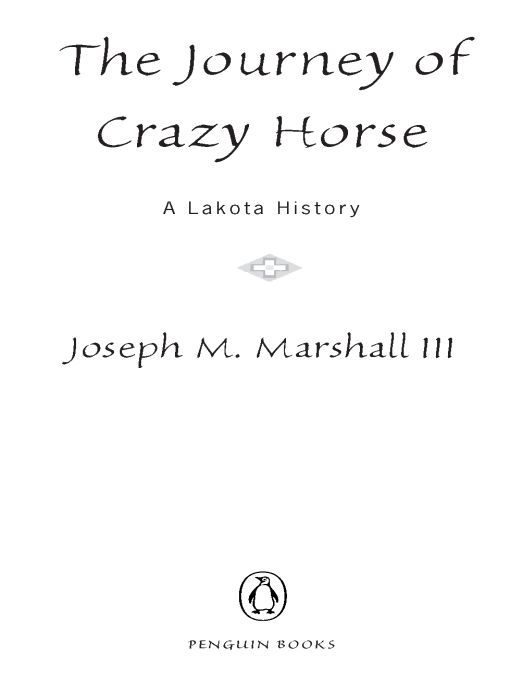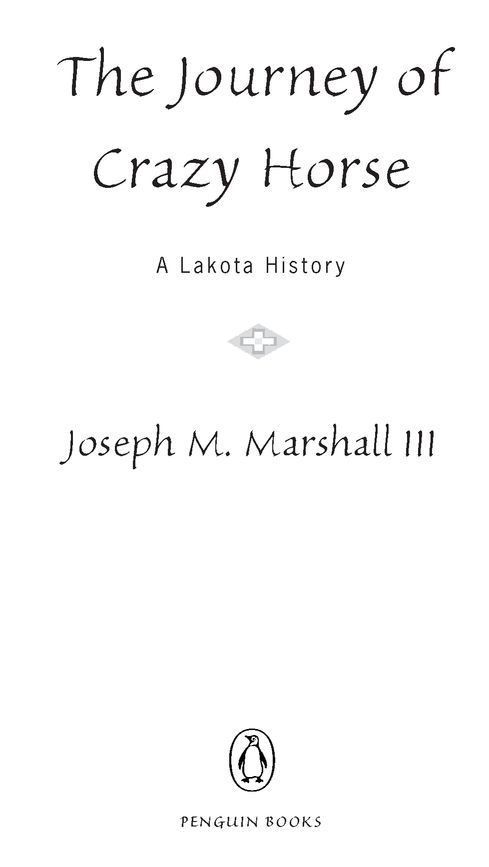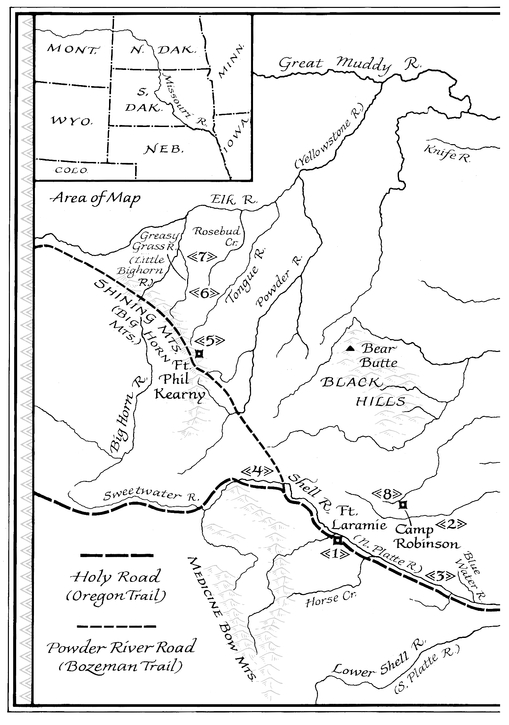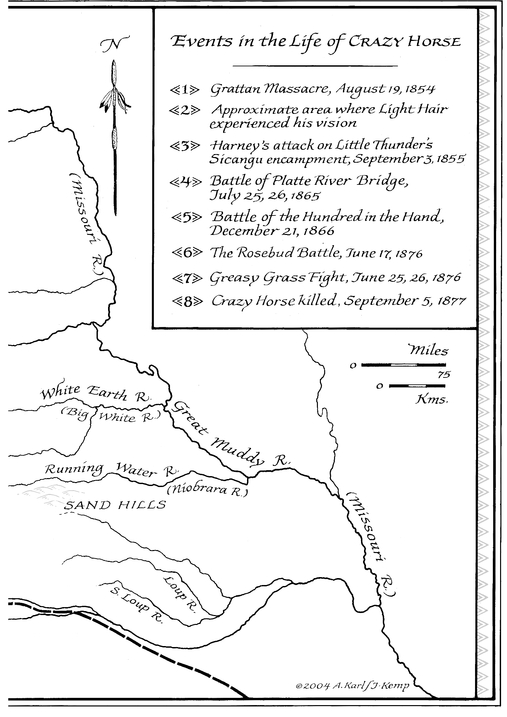Read Joseph M. Marshall III Online
Authors: The Journey of Crazy Horse a Lakota History
Tags: #State & Local, #Kings and Rulers, #Social Science, #Government Relations, #West (AK; CA; CO; HI; ID; MT; NV; UT; WY), #Cultural Heritage, #Wars, #General, #Native Americans, #Biography & Autobiography, #Oglala Indians, #Biography, #Native American Studies, #Ethnic Studies, #Little Bighorn; Battle of The; Mont.; 1876, #United States, #Native American, #History
Joseph M. Marshall III

Table of Contents
Praise for
The Journey of Crazy Horse
The Journey of Crazy Horse
“The legendary Lakota leader receives due honor in this searching biography. . . . A fine and necessary work.”
—
Kirkus Reviews
(starred review)
Kirkus Reviews
(starred review)
“Captivating and enlightening . . . poignant . . . This reader was left with the feeling of having just experienced a cultural epiphany.”
—Chuck Lewis,
True West
magazine
True West
magazine
“Marshall’s gloriously poetic and sweeping chronicle ushers in a new genre of American history—indigenous, oral, formerly supressed, a thrilling narrative based upon personal stories and hidden accounts only a trusted Indian scholar could collect and only a true-born writer could dramatize in print. Marshall renders the man and his times passionately alive. A tour de force.”
—Peter Nabokov, professor of American Indian Studies and World Arts and Cultures, UCLA, and author of
Native American Testimony
Native American Testimony
“Born about one hundred years after Crazy Horse, Joseph Marshall has drawn on oral histories passed down across the generations to find the human being behind the hero who has become a legend for Lakotas and non-Indians alike. The result is a remarkable portrait of a remarkable man.”
—Colin G. Calloway, professor of history and Samson Occom Professor of Native American Studies, Dartmouth College
“This story of treachery and honor has never been told better. Crazy Horse is no longer merely a symbol for the Oglala, or even for the Lakota, but has become an inspiration for all. Marshall’s scholarship is meticulous, his passion gripping. This is as composed and crafted as a fine novel.”
—Roger Welsch, Ph.D., anthropologist and author of
It’s Not the End of the Earth, but You Can See It from Here
It’s Not the End of the Earth, but You Can See It from Here
ABOUT THE AUTHOR
Joseph M. Marshall III, historian, educator, and storyteller, is the author of six previous books, including
The Lakota Way: Stories and Lessons for Living,
which was a finalist for the PEN Center USA West Award in 2002. He was raised on the Rosebud Sioux Indian Reservation and his first language is Lakota. Marshall is a recipient of the Wyoming Humanities Award, and he has been a technical advisor and actor in television movies, including
Return to Lonesome Dove.
He makes his home on the Northern Plains.
The Lakota Way: Stories and Lessons for Living,
which was a finalist for the PEN Center USA West Award in 2002. He was raised on the Rosebud Sioux Indian Reservation and his first language is Lakota. Marshall is a recipient of the Wyoming Humanities Award, and he has been a technical advisor and actor in television movies, including
Return to Lonesome Dove.
He makes his home on the Northern Plains.

PENGUIN BOOKS
Published by the Penguin Group
Penguin Group (USA) Inc., 375 Hudson Street, New York, New York 10014, U.S.A.
Penguin Group (Canada), 90 Eglinton Avenue East, Suite 700, Toronto,
Ontario, Canada M4P 2Y3 (a division of Pearson Penguin Canada Inc.)
Penguin Books Ltd, 80 Strand, London WC2R 0RL, England
Penguin Ireland, 25 St Stephen’s Green, Dublin 2, Ireland (a division of Penguin Books Ltd)
Penguin Group (Australia), 250 Camberwell Road, Camberwell,
Victoria 3124, Australia (a division of Pearson Australia Group Pty Ltd)
Penguin Books India Pvt Ltd, 11 Community Centre,
Panchsheel Park, New Delhi - 110 017, India
Penguin Group (NZ), cnr Airborne and Rosedale Roads, Albany,
Auckland 1310, New Zealand (a division of Pearson New Zealand Ltd)
Penguin Books (South Africa) (Pty) Ltd, 24 Sturdee Avenue,
Rosebank, Johannesburg 2196, South Africa
Penguin Books Ltd, Registered Offices:
80 Strand, London WC2R 0RL, England
First published in the United States of America by Viking Penguin,
a member of Penguin Group (USA) Inc. 2004
Published in Penguin Books 2005
Published by the Penguin Group
Penguin Group (USA) Inc., 375 Hudson Street, New York, New York 10014, U.S.A.
Penguin Group (Canada), 90 Eglinton Avenue East, Suite 700, Toronto,
Ontario, Canada M4P 2Y3 (a division of Pearson Penguin Canada Inc.)
Penguin Books Ltd, 80 Strand, London WC2R 0RL, England
Penguin Ireland, 25 St Stephen’s Green, Dublin 2, Ireland (a division of Penguin Books Ltd)
Penguin Group (Australia), 250 Camberwell Road, Camberwell,
Victoria 3124, Australia (a division of Pearson Australia Group Pty Ltd)
Penguin Books India Pvt Ltd, 11 Community Centre,
Panchsheel Park, New Delhi - 110 017, India
Penguin Group (NZ), cnr Airborne and Rosedale Roads, Albany,
Auckland 1310, New Zealand (a division of Pearson New Zealand Ltd)
Penguin Books (South Africa) (Pty) Ltd, 24 Sturdee Avenue,
Rosebank, Johannesburg 2196, South Africa
80 Strand, London WC2R 0RL, England
a member of Penguin Group (USA) Inc. 2004
Published in Penguin Books 2005
eISBN : 978-1-440-64920-2
1. Crazy Horse, ca. 1842-1877. 2. Oglala Indians—Kings and rulers—Biography.
3. Oglala Indians—Government relations. 4. Oglala Indians—Wars.
5. Little Bighorn, Battle of the, Mont., 1876. I. Title.
E99.O3C72457 2004
978.004’9752—dc22
[B] 2004049618
3. Oglala Indians—Government relations. 4. Oglala Indians—Wars.
5. Little Bighorn, Battle of the, Mont., 1876. I. Title.
E99.O3C72457 2004
978.004’9752—dc22
[B] 2004049618
The scanning, uploading and distribution of this book via the Internet or via any other means without the permission of the publisher is illegal and punishable by law. Please purchase only authorized electronic editions, and do not participate in or encourage electronic piracy of copyrighted materials. Your support of the author’s rights is appreciated.
Dedicated to the memory of two warriors
To one who died young
PRIVATE MELVIN C. MARSHALL
Forty-fourth Infantry Division
United States Army
Born—16 October 1926
Wounded in action—8 June 1945
Died of wounds—12 June 1945
Ohitiya Otanin
(His Courage Is Known)
Oglala/Sicangu Lakota
and
To another who made the most of the opportunity
the first did not have
JOHN R. WILLIAMS, ED.D.
Husband, father, teacher, Korean veteran, and friend
Born—13 June 1931
Died—4 September 2001
Mato Ihanbla
(Bear Dreamer)
Oglala Lakota
To one who died young
United States Army
Born—16 October 1926
Wounded in action—8 June 1945
Died of wounds—12 June 1945
(His Courage Is Known)
the first did not have
Died—4 September 2001
(Bear Dreamer)


Introduction to a Hero Story
The winter of 1866-67 was bitterly cold and snows were deep along the foothills of the Shining (Big Horn) Mountains in the region the Lakota called the Powder River country, in what is now north-central Wyoming. Buffalo were scarce and hunters had great difficulty finding elk and deer. Crazy Horse, then in his mid-twenties, and his younger brother Little Hawk did their share of hunting, risking their lives in the frigid temperatures as they searched for whatever game they could find. One day a sudden blizzard forced them to seek shelter, but in the midst of it they happened to see several elk that were also hiding out of the wind. After the storm abated somewhat the two hunters brought down several elk with their bows and arrows, not easy to do in extreme subzero weather. They transported the meat home and saved their relatives and friends from starvation. Only weeks before, on another unbelievably cold winter day, Crazy Horse had led nine other fighting men in luring eighty soldiers into an ambush by several hundred Lakota and Cheyenne warriors and into a battle known in the annals of Western history as the Fetterman Battle or Fetterman Massacre. It was a hard-fought battle and a decisive victory for the Lakota and their Cheyenne allies. During the decoy action Crazy Horse stopped well within enemy rifle range and calmly scraped ice from his horse’s hooves just to infuriate the pursuing soldiers.
He didn’t know, and wouldn’t have cared if he did, that he was laying the foundation for the myths and legends that surround his legacy.
Say the name Crazy Horse and immediately events such as the Fetterman Battle, the Battle of the Rosebud, and, of course, the Battle of the Little Bighorn come to mind for those who have some inkling of Western American history. They think in terms of the
legendary
Crazy Horse. Crazy Horse
was
the Lakota battlefield leader who, in the span of eight days, got the best of two of the United States Army’s field commanders: Brigadier General George Crook and Lieutenant Colonel George Custer. His exploits off the battlefield are less well known, however. Deeds such as finding meat in the middle of a blizzard endeared him to those who knew him as an ordinary man. He became a hero to them long before he became a legend in other peoples’ minds after Little Bighorn and the defeat of the Seventh United States Cavalry.
legendary
Crazy Horse. Crazy Horse
was
the Lakota battlefield leader who, in the span of eight days, got the best of two of the United States Army’s field commanders: Brigadier General George Crook and Lieutenant Colonel George Custer. His exploits off the battlefield are less well known, however. Deeds such as finding meat in the middle of a blizzard endeared him to those who knew him as an ordinary man. He became a hero to them long before he became a legend in other peoples’ minds after Little Bighorn and the defeat of the Seventh United States Cavalry.
Crazy Horse has been my hero since I was a boy. He was arguably the best-known Lakota leader in the latter half of the nineteenth century, a turbulent time on the northern Plains. His name floats in the consciousness of most Americans, along with the names of indigenous leaders and heroes from other tribes, such as Geronimo of the Chiracahua Apache, Chief Joseph of the Nez Perce, Washakie of the Eastern Shoshoni, and Quannah Parker of the Comanche, to name a few. He is certainly no less known than Sitting Bull, the Hunkpapa Lakota medicine man and political leader who was his friend and ally, or Red Cloud, his fellow Oglala, who was not among his friends.
At first I knew Crazy Horse only as a fighting man, the warrior. I didn’t know or care what he felt, what he thought; I cared only that he was Lakota and that he was brave and performed deeds that fired my imagination. But as time went on there were more stories. I now know Crazy Horse as a man first and a legend second, a very distant second. In fact, he is much like my father and my uncles and all my grandfathers. He walks straight, he is polite, and he speaks softly. But there is also an aura of mystery about him, as though sometimes I am seeing him in a mist that blends legend and reality. It’s that aura that seems to appeal most to people and I’m convinced that many want to connect with the mystery more than they want to identify with the man.
Other books
Anna Jacobs by An Independent Woman
Hard Days Knight: Under-Cover Knights, Book 1 by Livia Quinn
The Whispering Trees by J. A. White
Blackdog by K. V. Johansen
Azteca by Gary Jennings
Holiday in Handcuffs by Yvette Hines
Don't Let Go by Sharla Lovelace
Conquering the Queen by Ava Sinclair
Fallen Angel From Revenge to Redemption by Deborah R. Brandon
Martha Peake by Patrick Mcgrath

